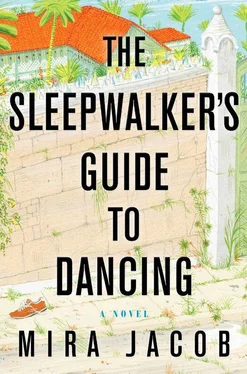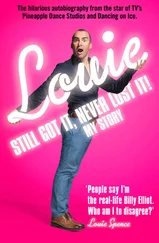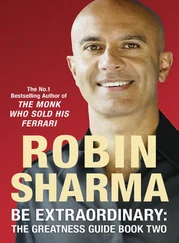Dimple looked from one of them to the other, her eyes hard. She leaned back in her chair. “I am so glad I don’t have a sibling.”
After everyone left, Akhil and Amina returned to the roof and sat, looking up at the disappointing sky. It had darkened to an unimaginative gray, a color so bland that it almost seemed clear, except for the faint and loosening seam drawn by a vanished airplane. Amina thought of the smell of pipe smoke that lingered in the downstairs bathroom even when her father had been gone for days, the dinner plate that sat in the kitchen sink every morning, thin and dry as a bone sucked clean.
“Do you think he’d ever really leave?” Amina asked.
“What?”
“Dad. Us.”
Akhil shrugged. “Indians don’t leave. They’re into the whole live-forever-in-misery thing.”
Amina considered this. “You think he’s miserable?”
“I think he’s a product of his race and time.”
She frowned. “You really think he’s miserable?”
“Aren’t we all?”
“Not really.”
“Whatever. I’m just saying, there are things you can’t avoid,” Akhil said. “It’s in the genes — good teeth, bad skin, bad body. Lives of indentured gratitude.”
“In-whatered what?”
“You know, bowing and scraping all the time because we’re so goddamn thankful just to be in the country. Acting like anyone who talks to us is doing us some big favor.”
“When are you bowing and scraping?”
“When am I not? Jesus! Did you know Mom actually thanked Mrs. Macklin for kicking me out of French last year?”
“She thanked her for teaching you a lesson.”
“She thanked her for being an asshole. I’m surprised she didn’t invite her over for dinner afterward. Oh yes, I make the most wonderful biryani, have you tried? ” He laid the accent on thick, wobbling his head from side to side.
“Shh.” Amina pointed toward the sky. She had heard it — the scratchy honk that could only emanate from a trumpet-thin throat, the slightly higher note that it ended on, as though asking a question. She looked up. The wails grew louder, raspy, doubling on one another, rising up into mini-crescendos and bouncing off the cottonwoods and the adobe wall behind their heads. The first goose appeared, piercing the clean wipe of sky above them. The black hull of its wings pitched against the wind, and it floated there, seemingly unmoving, tethered to the clouds. Amina held her breath. Another goose appeared, and another. Each angled behind the next so that they formed an undulating V. Sharp cries hollowed in timbre and grew louder in the meat of Amina’s heart. Akhil smiled. The birds reeled in wide circles above them.
“Wingspans big as a man,” Amina said.
“A lucky man,” Akhil corrected. A rare look of unmitigated longing crossed his face. She pressed the camera back up to her face quickly.
“You’ll grow,” she said.
Why did she decide to photograph an empty classroom the next day? Amina had no idea, just the hope that the empty desks would somehow say something to someone about anything at all. Instead, all it did was make her late to English class.
“Nice of you to join us.” Mr. Tipton didn’t even look up when she entered the class, while Gina Rodgers, mid-sentence, glared at her over an open mouth. Amina crossed the room hastily, sitting down in her chair. “Act two, scene five. Go on, Gina.”
“I just mean that his father was a real leader, so Hamlet has to respect his wishes,” Gina said.
Amina stared at the page, catching her breath.
“What do you think, Amina?” Mr. Tipton asked.
“Of Hamlet’s father?” she stalled.
“Yes.”
“In general?”
“In specific.”
“Oh. Uh …” She stared at Akhil’s scribbling in the margin. “I don’t think he’s real.”
“Of course he’s not real ,” Gina said. “He’s a ghost.”
“I know that,” Amina said, feeling her face flush brightly. “But I don’t think he’s even a real ghost. I think he’s, you know, a figment of imagination or something.”
“But the guards see him,” Gina said.
“A figment of whose imagination?” Mr. Tipton asked. His tone had changed to one of encouragement.
Akhil had written it in bold letters. “Denmark’s.”
Mr. Tipton smiled. “Say it again. I want everyone to hear.”
Amina felt the gaze of the class upon her, and she looked at her book to not lose her nerve. She said it again. Mr. Tipton’s eyes crinkled like she’d discovered a lost page of the Bible.
“So you mean a collective conscience?” he asked.
“Kind of, or maybe more like—”
Someone was knocking on the classroom door. Mr. Tipton moved to the door and threw it open with one smooth movement, nodding to encourage her, but Amina’s words died in her throat. Akhil stood in the doorway picking at his face, belly pooling over his jeans.
“I need my sister,” he said.
“I was afraid you were going to say that,” Mr. Tipton sighed. “We were on a roll.”
Amina rose, lifting her backpack from the floor. She walked out the door and Mr. Tipton followed.
“Everything okay?” he asked.
“No. I mean, I don’t know.” He handed the teacher a note, which was read, refolded, and slipped into a lavender shirt pocket.
“Okay then.” Mr. Tipton turned to Amina and squeezed her shoulder. “We’ll continue our conversation later.”
They flew down Coors Boulevard, music off, windows sealed shut.
“What did the message say?” Amina asked again.
“To get you and to come home.”
“That’s all?”
“That’s all.”
Amina nodded. They were on a mission. She would be brave. It was exciting, actually, leaving school in the middle of the day, zipping back through the empty roads.
“Maybe they are getting a divorce,” Akhil said, passing one of the gated residential neighborhoods.
“What?”
“You know, like they’re separating.”
Amina dropped her hand. “I thought you said they would never—”
“What do I know? I don’t know squat.”
“But …” Amina searched for something to abate the swiftly growing panic in her. “But why would they make us come home from school to tell us that?”
“Maybe he’s moving out today.”
Amina’s stomach lurched. “No.”
“Well, what else could it be?”
Her eyes filled with tears. “You really think so?”
Akhil looked over at her. “Don’t fucking cry about it, kid. God, I just told you I have no idea. I’m just saying maybe.”
“But I thought you said that Indians—”
“Don’t you know everything can always change and it always will, probably for the worse?” Akhil shook his head. “I mean, that’s basic, Amina. Please tell me you know that.”
Amina’s nose was filling with snot. She tried to breathe and found she could not. Outside, neighborhood cul-de-sacs spiraled away from them like galaxies, infinitely repeating fractals of driveways and front doors and welcome mats. Could her father do that? Could he really leave them?
“What if he’s hurt?” she asked.
“He’s not.”
“Like, dead or something?” Amina swiped at her nose with her hand. “What if he was in an accident? You know how he drives. What if the car flipped over? Heart attack?” Her voice was edging into hysterical territory.
“That didn’t happen,” Akhil said, but visibly paled. He opened his mouth as if to say something else but then bit his lip and slipped a tape into the deck.
Twenty minutes later they sat in the driveway, listening to Judas Priest growl out “Breaking the Law” and staring at the cars. Cars because there were two, their mother’s hatchback and their father’s sedan, neither with any visible damage.
Читать дальше












